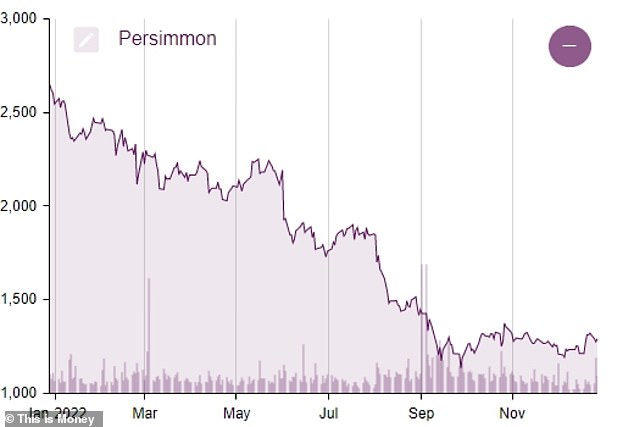Persimmon follows Barratt in reporting sharp drop in demand
>
Persimmon sales are falling as rising interest rates and mortgage costs weaken the UK housing sector
- Interest rate hikes by the Bank of England caused an increase in mortgage payments
- The ‘mini-budget’ at the end of September further damaged activity in the housing market
- Private weekly net sales fell to just 0.30 per outlet in the fourth quarter
Persimmon is the latest housing developer to point to a major slowdown in sales due to heightened uncertainty in the real estate market.
The FTSE 100 homebuilder told investors on Thursday that demand began to moderate in the second half of 2022 as successive rate hikes by the Bank of England fueled rising mortgage costs.
Trade was further hurt by rising UK inflation, which reached a four-decade high in November amid skyrocketing energy prices, and the end of applications for the Help to Buy scheme in England.
Performance: Persimmon sales suffered in all regions, but experienced the greatest contraction in Southern England and in locations where Help to Buy had an outsized presence
These factors particularly affected the group’s performance following former Chancellor Kwasi Kwarteng’s controversial ‘mini budget’ at the end of September, which led to a sell-off in government debt and a spike in mortgage rates.
Private weekly net sales fell to just 0.30 per outlet in the fourth quarter, compared to 0.63 in the previous three months and 0.91 in the first half of the year.
Sales suffered in all regions, but experienced the biggest contraction in the South of England and in locations where Help to Buy had an outsized presence.
Due to weaker demand and higher cancellation volumes, Persimmon’s forward position fell by around £600m to £1bn over the last 12 months.
Housing rival Barratt Developments reported a similarly severe downturn in its order book on Wednesday as it warned of “uncertain” prospects for the second half of the financial year.
In response to the current market woes, Britain’s largest property construction company said it had slashed land approval numbers, halted recruitment and imposed additional controls on opening new sites.

: Due to weaker demand and higher cancellation volumes, Persimmon’s forward sales position fell by approximately £600m to £1bn over the last 12 months
Persimmon has also decided to renegotiate or halt development at about 30 sites, and plans to be “very selective” with any new land acquisition.
“We remain focused on delivering quality returns rather than volume,” added the Yorkshire-based firm, which expects most land spending in 2023 to be focused on settling land creditors.
But CEO Dean Finch said the company was “well placed to navigate this challenging near-term situation, while continuing to take advantage of any opportunities that may arise.”
Persimmon shares were among the best risers in the FTSE 100 on Thursday morning, rising 5.9 per cent to £13.58.
However, like most other major homebuilders, the group’s share price has fallen significantly over the past 12 months as economic uncertainty weighed on activity.
Redrow Shares have shrunk by about a quarter; Taylor Wimpey shares have lost 36 percent of their value, while Barratt Developments and Vistry Group Shares are each down about 40 percent.
However, persimmon stocks far underperformed the broader sector, falling by more than half.
Analysts at Liberum suggested this may be due to the company’s slow pace of site opening, high valuation, the possibility that high returns could deviate from industry norms and heavy reliance on start-ups.
Persimmon estimates that some of the first-time homeowners have seen their monthly mortgage payments double over the past year due to the end of Help to Buy and the rise in mortgage rates.

The share of persimmon has almost halved in the past 12 months
